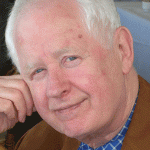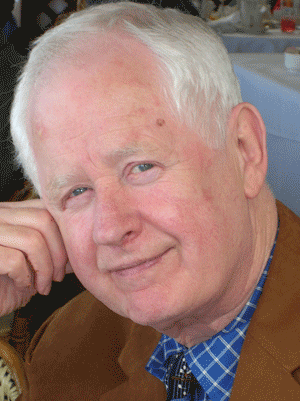
BY ALFIE MCCOURT | In 2008, during the presidential election campaign, I remarked that the Clintons, in facing Barrack Obama, an African-American and a candidate for the Democratic Party’s nomination, had found themselves between a rock and a hard place. (“You mean a Rack and a hard place,” said my friend Jimmy).
A short time later Senator Obama himself was in a difficult position. In defending his relationship with his pastor, Reverend Wright, he had to articulate, in one short speech, the agony of bigotry that has tortured these United States for hundreds of years, while knowing full well that a safe haven from that torture is nowhere in sight.
I recently had a conversation with an African-American woman. Ours is a working relationship. Conversation may be casual but because our relationship is work related I have to be doubly careful in what I say. A stray remark could land me in trouble. She is about 55 years old. I was sympathetic to her complaints regarding race and the unfairness of it all and I agreed with some of her observations. Once before, in a similar situation, I had been suckered into offering an opinion and I had paid the price, and so now I had to be careful of what I said. On that earlier occasion the woman was coldhearted and calculating. This woman, however, I’ll call her Odile, has a good heart.
Still, she did go on. I was frustrated. I could have said a lot but the unwritten rules held me back. Mind you, the rules are sometimes a blessing. Had I been free to speak I might have offered something like, “Yes, some of my best friends,” etc., or, “Someone once told me a story.” I might have said, “You’re right, your people have been crucified for centuries,” or “Yes, but what about the immigrants? They’ve had a tough time, too.” Or something equally lame, or even more stupid. Odile had unleashed a torrent. She had trusted me with her honesty and I owed her something more than a few perfunctory remarks.
Some of what she said I had heard before. The great-grandfather, son of a freed slave, stayed in the South. His son, the grandfather, migrated north, only to find a different kind of segregation; a segregation more deeply entrenched in the North than it ever was in the South. The grandmother scrubbed floors while the grandfather worked as a janitor. Their son goes to high school. His child goes on to college and gains a degree, but, because of his color, his employment and other opportunities are limited.
Then there are the European immigrants. The grandfather and grandmother worked three jobs apiece (a miracle in itself, or simply the stuff of legend?) and went to school at night to learn English and, in time, a high school equivalency diploma. (Their grandchildren, contemptuous of the new immigrants, will boast about their grandparents’ hard work and their accomplishments, as if they themselves had done it all. Meanwhile, were they, the grandchildren, to stray more than two feet from their computer keyboard, they might well collapse from exhaustion or end up completely disoriented.) The oldest grandchild goes to high school. His son, in turn, achieves a college degree.
Descendants of immigrants appear to do better, to rise faster and higher, than do native African-Americans. And now, it seems, both groups resent the flood of Latinos and Asians. According to the descendants of earlier European immigrants, the Latinos are on welfare forever and the Asians colonize whole cities while their children flock to Harvard, Princeton and MIT. And the Asians have no sense of humor. I’ve had these conversations. Barroom and barbershop are the great incubators of opinion.
I feel a kinship with President Barrack Obama. He had been under attack from the bigoted side. Odile had witnessed bigotry and been a victim of it; and all too often had drunk from the bowl of bitterness. Because of my skin color, she probably assumed that I view matters from the opposite side of the debate. But I have some understanding of what she and President Obama are talking about, not much, but some. I’m Irish, after all, and an immigrant but it would be a mistake for me to say anything. Senator Obama, at least, got to make a speech.
If I could make a speech I would tell the world, or my audience of two, that I am sick to death of the great white liberals, the ones whose disgust at the mere presence of a smelly homeless man, while understandable, far exceeds any kindness they might ever have felt. If they had their way, every homeless person would be provided with an Internet connection, so he or she could contact the appropriate agency and not be bothering the rest of us.
Then there are the champions of Equal Rights and Civil Rights on talk radio. They address each other as brother and sister. To the champions of Civil Rights and Equal Rights I will never be a brother. The brotherhood is an exclusive club and I am a man and blue-eyed devil, the cause of all the evil and injustice in the world. That’s not bigotry, is it? The Irish suffered under bigotry. No Irish Need Apply, for jobs and apartments: That was the catch phrase. For us, bigotry and discrimination are a gut memory but we can never be accepted as brothers and sisters.
And then there are the archconservatives, the ones who tether their horses to the rail of the Constitution, and buy any election they can get their hands on. By their reckoning, fair play must make its obeisance at the altar of the free market, and they oppose any measure bearing even a hint of social equality. At the end of the game they will hold all the toys, and that fits well with their sense of entitlement. If they don’t have forbears who came over on the Mayflower then they will cheerfully invent ’em, while masking their motives under the hoary banner of patriotism.
I’m tempted to offer some bromides to Odile but still I must hold back. I’m becoming frustrated.
“Listen, Odile,” I say to her, “you and I can’t solve these problems. Even with all the goodwill in the world. There are extremists on both sides, the people who, for their dubious living, depend on the perpetuation of divisiveness and bigotry. They command the headlines. As for the rest of us, the millions of people of goodwill on both sides? We have little or no voice and are rarely heard from.”
“How about this?” I add. “Why don’t we try something different? Why don’t we do something as individuals? On the street, on the subway, in a store, we could stand back and let someone else go first. Maybe even hold the door for them, no matter who they are, with no ceremony and with no expectation?”
“Yes,” I imagine Odile laughing, “try that in my neighborhood. The guy you hold the door for might just pull a gun on you.”
But she isn’t really listening. She steps into the elevator. Glad to get away, I’m sure and she is entitled. A fine woman, she does worthwhile work.
It might have been simpler, less preachy, if I had told her about my encounter, in 1974, in San Francisco. I was in my early thirties and standing at a bus stop when I fell into conservation with a black man in his fifties. He addressed me as brother. We boarded the bus. He headed for the back seat, which was almost full, found a seat and made the other people move over so I could sit down. I was only going a short distance and would have preferred to stand. But he had gone to a lot of trouble to secure a seat for me. I would not risk hurting his feelings and so I sat down. We resumed our conversation.
I had been burning to ask him and now I did: “What’s a brother?” I asked. “A brother,” he said, “is a man without hate.” My stop was coming up but I couldn’t just leave the bus at that point. We continued talking. Soon my new friend stood up, shook hands with me and got off the bus.
At the next stop I got off the bus, crossed the street to a bar, ordered a beer and used the men’s room. I was the only white face around as I boarded the bus that brought me back to my original destination. Where is he now, my brother? And that bus? Does it still run?



































